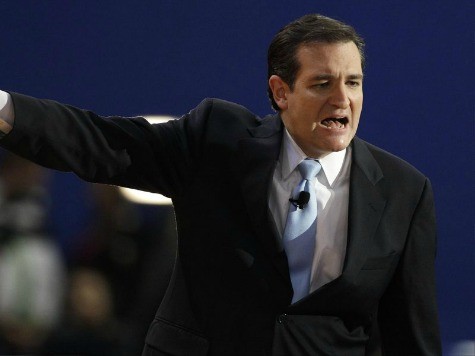
So Ted Cruz doesn’t trust the Republicans. Imagine that.
“Let me be clear” he said on the Senate floor the other day. “I don’t trust the Republicans, and I don’t trust the Democrats.” And why not? The last four years have given us all ample reason not to trust the Democrats, as $1 trillion deficits have become the new normal and the national debt has zoomed toward $17 trillion, all under the Obama-Pelosi-Reid team’s watch.
But what about the Republicans, who so often claim to be the party of limited government? The truth is, the GOP’s record is seldom as grand as its rhetoric. Aside from a few Tea Party stalwarts, plenty of Republican senators are ready to throw in the towel on the debt ceiling, let it go up, and get a few scraps from the Democrats in return.
“Here is the dirty little secret about some of those on the right side of the aisle,” Cruz was quoted in the New York Times. “There are some who would very much like to cast a symbolic vote against raising the debt ceiling and nonetheless allow our friends on the left side of the aisle to raise the debt ceiling. That, to some Republicans, is the ideal outcome.”
He is right about that. Senior Republican staffers in Congress tell me that members of the Republican Leadership in both houses of Congress are terrified of not raising the debt ceiling, having been convinced that calamity will ensue if we don’t. But the alternative? Senate Majority Leader McConnell would, I am told, be happy to see the debt ceiling raised with no Republican votes. Then Republicans can beat up Democrats for raising it, while knowing that the economy won’t explode as Paul Krugman has warned it would.
And if House Speaker John Boehner had to choose between a clean debt ceiling increase (one with no limits, allowing Obama to keep raising it ad nauseum) and no debt ceiling increase at all, I am told he would take the former by conservatives in the House of Representatives.
So the establishment Republican mind-set says, “More debt is better than a melt-down, but at least get something in return, even if it doesn’t mean much, we have something to run against the Democrats with.” What do they want in return? They know they don’t have the votes to get much in the way of budget cuts, so they can at least keep the base happy with talk about “economic growth.”
When Cruz, who is anything but your traditional freshman back-bench Senator, said he didn’t trust Republicans, the party establishment, led by John McCain, howled in response. But where is the Republican leadership’s credibility? When they last held real power, these Republicans goosed up domestic discretionary spending faster than it rose under Bill Clinton and piled on the debt.
It was under a Republican president and Congress that we got Medicare Part D, the biggest new entitlement since LBJ’s Great Society. The prescription drug benefit added trillions to Medicare’s unfunded liabilities, passed only when party bosses needed to violate normal procedures to get the votes to pass it. Former U.S. Comptroller David Walker called it “the most fiscally irresponsible piece of legislation since the 1960s.”
Medicare’s chief actuary, Richard Foster, later said he was threatened not to reveal that the drug benefit’s price tag would exceed $400 billion in the first ten years. This figure was necessary under congressional rules to keep the bill from being blocked on a point of order. Foster estimated the real price tag was in excess of $500 billion. Several GOP congressmen would also recount arm-twisting tactics from the party leadership that went beyond the norm.
Instead of reducing the federal role in education, the Bush Administration and Republicans in Congress gave us No Child Left Behind, which helped double the size of the Department of Education, a Cabinet-level agency Republicans had pledged to abolish as recently as 1996. John Boehner, now the speaker of the House, was an NCLB sponsor and described its enactment as “one of the proudest accomplishments of my tenure in Congress.”
Under a Republican president and Congress, a $128 billion surplus was replaced by a $455 billion deficit. By the time George W. Bush left office, the shortfall was $1.2 trillion. Discretionary spending went up faster in Bush’s first term than it did in eight years under Bill Clinton. Under Bush’s watch, the federal budget exceeded $2 trillion, and then $3 trillion, for the first time. Most of these milestones were reached before the Democrats retook Congress. Federal spending rose from 18.4 percent of GDP to an average of 20.51 percent under Bush.
Bush and the Republican establishment bailed out the Wall Street banks with the $700 billion Troubled Assets Relief Program (with Democratic support, naturally). They bailed out the auto industry. They even pioneered a pre-Obama stimulus program, with similar results. The deficits and government growth would later endanger the Bush tax cuts, one of the signature conservative policy achievements of the period.
The Republicans who would negotiate the debt ceiling with the Democrats in a conference will be the same people who voted for all this big government and their successors. This unfortunately includes even Paul Ryan. What faith can we have that the results will be different this time?
So is there any doubt at all why Ted Cruz doesn’t trust Republicans? He explained that he thinks “a whole lot of Americans likewise don’t trust the Republicans and the Democrats because it is leadership in both parties that has gotten us in this mess.”
Maybe we need new leadership.

COMMENTS
Please let us know if you're having issues with commenting.